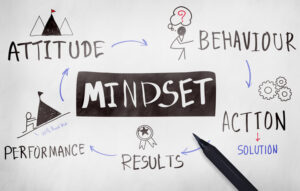Being resilient is hard in the face of rapid and abrupt change especially when the dramatic changes are unexpected and out of your immediate control. Resisting change expends a tremendous amount of energy and can be debilitating. It can be mentally draining and ultimately have serious physical consequences if we can’t adapt and accept change in a more positive mindset.
Let’s put things into prospective. Change actually happens every day. Most changes are small and don’t impact us directly but change is something that humans have to deal with constantly. Weather changes, traffic interruptions or unexpected delays, and the effects of aging impact us every day and for the most part, we deal well with them. In other cases, change can overwhelm us and it can bring on more unintended consequences. So, what can you do to deal with change?
ActionCOACH have a formula for change that is taught to business owners worldwide to help them adapt and deal with change. The formula is (D x V) + FS > R; Dissatisfaction times Vision + First Steps is greater than Resistance. The fundamental points made is that in order to continue to grow and succeed, overcoming the negative aspects of change is critical. We can apply this formula to help us cope and deal with change. ActionCOACH stresses that shifting your mindset and dealing with change proactively and positively is the foundation to long-term success.

Here are some ways to adjust personally and professionally.
Acknowledging change is the first step
First, you have to accept that change is indeed happening. Come to turns with the big picture, but that doesn’t mean you have to take on all the ills of the entire world on your shoulders. Compartmentalise and break down the changes into manageable pieces. Acknowledging change is the first step. That doesn’t mean you have to change everything at once but understanding that conditions are now different is a good step. Ultimately, taking the first steps toward accepting and adapting to change may not be based on data. You may have to make a ‘leap of faith’ but if you have a support system, mentor or advisers in place, dealing with change might be easier.
Keep routines you can in place
Consistency is often challenged in times of great change. Routines and patterns are a way to reduce stress in many and keeping as much of your day-to-day activities unchanged as possible. Keep the time you get up the same, making beds, and dressing for work are all routines you can maintain to help ease some stress. Even if your work life has been altered and you are now working from home remotely, keep behaving and preparing yourself for your daily responsibilities to keep you focused and effective. It may be time to set new goals or perhaps to alter the way or the methodology how you achieve your goals, keep in mind, dramatic change doesn’t mean abandoning your goals all together.
Take care of yourself
It is paramount that your take care of your physical and mental health during times of crisis and sweeping change. That means eating healthy, getting enough sleep and continuing exercise are even more important during stressful times. If you have an exercise regime, keep it going. If you don’t regularly exercise, this may the time to start. Consider meditation, yoga and low impact exercise to keep you as healthy as possible. Keep moving, to keep moving forward.
Communicate & Ask for help
Isolation and social distancing can also lead to added stress in your life. It is important that you communicate your feelings and find someone to confide in. Find support from a professional and seek someone who you trust and who you can talk to about your uncertainty in a candid open way.
Focus on the Positive & Be Grateful
While change can bring negative outcomes, often positive and unaccepted upsides can result. Take time to consider the positive situations and circumstances that might happen due to the changes. More time with immediate family; more time to complete items on your to-do lists, more time to get organised; and or time to do something you have been putting off. Focusing on positives can help keep you from fixating on the negatives. Have gratitude and when possible share your positive attitude with others. Smile, be kind and simply being respectful, can go along way to defusing the stress from change.
Unplug & Decompress
Being informed and staying current with the most up-to-date news is important and if knowledge gives you solace, then give yourself times to gather the information you need to feel more comfortable. But there is a point of diminishing returns. Too much news, too many stories and a continual bombardment of data can increase stress and angst. Know your limits. Take time to unplug and change your perspective. Watch a favourite film, re-read a classic book or listen to your favourite music to give you some respite from the news.

Additional stress can come from those around you who are resistant to change. Some within your inner circle may be scared and their focus on negative outcomes can keep you from making necessary changes. So, unplugging or tapping into other sources who may be dealing with change in a proactive and positive way is important.
This isn’t a comprehensive list of ways to deal with change or how to mitigate the impacts of change. Every person deals with change differently, and the more equipped you are the more positive the outcome. Everyone has to find ways to adapt and handle change in their lives in order to keep moving forward.







You’ve really gone above and beyond with the research for this article.
Your blog deserves recognition.
In a world where sharing and managing digital files have become crucial, FlashUpload.cloud stands out as an indispensable online storage solution. Whether you are an occasional user or a professional looking for a reliable and efficient platform, FlashUpload.cloud has something to offer everyone. In this blog post, we will explore the benefits and unique features of FlashUpload.cloud, with a focus on its premium membership plans.
Simply desire to say your article is as surprising The clearness in your post is simply excellent and i could assume you are an expert on this subject Fine with your permission let me to grab your feed to keep up to date with forthcoming post Thanks a million and please carry on the gratifying work
Wonderful web site Lots of useful info here Im sending it to a few friends ans additionally sharing in delicious And obviously thanks to your effort
Somebody essentially help to make significantly articles I’d state. This is the first time I frequented your web page and up to now? I surprised with the research you made to make this actual post incredible. Fantastic job!
Wonderful web site Lots of useful info here Im sending it to a few friends ans additionally sharing in delicious And obviously thanks to your effort
탑플레이어 머니상: https://www.youtube.com/watch?v=XJwhpzKSfM4
Excellent piece! Your analysis is insightful, and the material is well-organized and simple to grasp. Your study and writing of this are greatly appreciated. For those curious about this subject, it’s an excellent resource.
Your articles never fail to captivate me. Each one is a testament to your expertise and dedication to your craft. Thank you for sharing your wisdom with the world.
Your writing is like a breath of fresh air in the often stale world of online content. Your unique perspective and engaging style set you apart from the crowd. Thank you for sharing your talents with us.
탑플레이어 포커 머니상은 간편하고 빠른 거래 시스템으로 포커 머니 거래를 더욱 쉽게 만들었습니다. 지금 바로 탑플레이어 포커 머니상에서 편리한 거래를 경험하세요! https://youtu.be/_WIpuTMSI5w
I simply could not go away your web site prior to suggesting that I really enjoyed the standard info a person supply on your guests Is going to be back incessantly to investigate crosscheck new posts
Hey there You have done a fantastic job I will certainly digg it and personally recommend to my friends Im confident theyll be benefited from this site
Your ability to distill complex concepts into digestible nuggets of wisdom is truly remarkable. I always come away from your blog feeling enlightened and inspired. Keep up the phenomenal work!
Your blog is a testament to your expertise and dedication to your craft. I’m constantly impressed by the depth of your knowledge and the clarity of your explanations. Keep up the amazing work!
I do believe all the ideas youve presented for your post They are really convincing and will certainly work Nonetheless the posts are too short for novices May just you please lengthen them a little from subsequent time Thanks for the post
Its like you read my mind You appear to know so much about this like you wrote the book in it or something I think that you can do with a few pics to drive the message home a little bit but instead of that this is excellent blog A fantastic read Ill certainly be back
O que eu não entendo é na verdade como você não é realmente muito mais querido do que é agora Você é muito inteligente Você sabe, portanto, significativamente no caso deste tópico que me produziu individualmente, imagine-o de vários ângulos diferentes É como homens e mulheres não pareça fascinado até que seja algo a ver com Mulher gaga Suas próprias coisas são legais Todo o tempo cuide disso
O que eu não percebo é que você não é mais bem-favorecido do que você é agora Você é muito inteligente Você sabe muito sobre esse assunto me fez acreditar nisso de vários ângulos diferentes É como homens e as mulheres não ficam fascinadas até que seja algo a ver com Lady gaga Suas próprias coisas excelentes O tempo todo cuide disso
Ny weekly I appreciate you sharing this blog post. Thanks Again. Cool.
La weekly For the reason that the admin of this site is working, no uncertainty very quickly it will be renowned, due to its quality contents.
I loved as much as youll receive carried out right here The sketch is attractive your authored material stylish nonetheless you command get bought an nervousness over that you wish be delivering the following unwell unquestionably come more formerly again as exactly the same nearly a lot often inside case you shield this hike
Real Estate There is definately a lot to find out about this subject. I like all the points you made
BaddieHub Pretty! This has been a really wonderful post. Many thanks for providing these details.
BaddieHub I truly appreciate your technique of writing a blog. I added it to my bookmark site list and will
BaddieHub I appreciate you sharing this blog post. Thanks Again. Cool.
Hello Neat post Theres an issue together with your site in internet explorer would check this IE still is the marketplace chief and a large element of other folks will leave out your magnificent writing due to this problem
Tech to Trick I like the efforts you have put in this, regards for all the great content.
Our carbon steel pipes, used for high-temperature water transport, are another hallmark of quality at Elite Pipe Factory. These pipes are designed to handle extreme conditions, providing reliable performance in demanding environments. With our reputation for excellence in Iraq, you can trust that our carbon steel pipes are crafted to the highest standards. Learn more at elitepipeiraq.com.
Fiberglass and Resin Pipes in Iraq ElitePipe Factory in Iraq is proud to be a leading producer of high-quality fiberglass and resin pipes, delivering superior performance and durability for various industrial applications. Our fiberglass reinforced plastic (FRP) pipes, also known as GRP pipes, offer excellent corrosion resistance, lightweight properties, and long-lasting service life. These attributes make them ideal for use in demanding environments such as chemical processing, water treatment, and oil and gas industries. With our commitment to innovation and quality, ElitePipe Factory ensures that every pipe meets rigorous standards, establishing us as one of the best and most reliable suppliers in Iraq. For more information, visit our website at elitepipeiraq.com.
PP Pipes in Iraq Elite Pipe Factory in Iraq specializes in the production of PP pipes, which are known for their excellent chemical resistance, high impact strength, and thermal stability. Our PP pipes are designed to meet stringent quality standards, making them a reliable choice for industrial and commercial applications. As one of the best and most reliable pipe manufacturers in Iraq, Elite Pipe Factory ensures that our PP pipes deliver superior performance and durability. Explore our range of PP pipes by visiting elitepipeiraq.com.
HDPE Cable Ducts At ElitePipe Factory in Iraq, our HDPE Cable Ducts are engineered for superior durability and flexibility, making them ideal for protecting electrical and communication cables in various environments. Made from high-density polyethylene, our ducts offer excellent resistance to impacts, chemicals, and environmental conditions, ensuring the longevity of the cables they encase. As one of the leading manufacturers in Iraq, ElitePipe Factory is committed to delivering HDPE cable ducts that meet the highest quality standards and provide reliable performance. Learn more about our HDPE solutions on elitepipeiraq.com.
I loved as much as you will receive carried out right here. The sketch is attractive, your authored material stylish. nonetheless, you command get got an impatience over that you wish be delivering the following. unwell unquestionably come more formerly again since exactly the same nearly a lot often inside case you shield this hike.
شركة Bwer هي أحد الموردين الرئيسيين لموازين الشاحنات ذات الجسور في العراق، حيث تقدم مجموعة كاملة من الحلول لقياس حمولة المركبات بدقة. وتغطي خدماتها كل جانب من جوانب موازين الشاحنات، من تركيب وصيانة موازين الشاحنات إلى المعايرة والإصلاح. تقدم شركة Bwer موازين شاحنات تجارية وموازين شاحنات صناعية وأنظمة موازين جسور محورية، مصممة لتلبية متطلبات التطبيقات الثقيلة. تتضمن موازين الشاحنات الإلكترونية وموازين الشاحنات الرقمية من شركة Bwer تقنية متقدمة، مما يضمن قياسات دقيقة وموثوقة. تم تصميم موازين الشاحنات الثقيلة الخاصة بهم للبيئات الوعرة، مما يجعلها مناسبة للصناعات مثل الخدمات اللوجستية والزراعة والبناء. سواء كنت تبحث عن موازين شاحنات للبيع أو الإيجار أو التأجير، توفر شركة Bwer خيارات مرنة لتناسب احتياجاتك، بما في ذلك أجزاء موازين الشاحنات والملحقات والبرامج لتحسين الأداء. بصفتها شركة مصنعة موثوقة لموازين الشاحنات، تقدم شركة Bwer خدمات معايرة موازين الشاحنات المعتمدة، مما يضمن الامتثال لمعايير الصناعة. تشمل خدماتها فحص موازين الشاحنات والشهادات وخدمات الإصلاح، مما يدعم موثوقية أنظمة موازين الشاحنات الخاصة بك على المدى الطويل. بفضل فريق من الخبراء، تضمن شركة Bwer تركيب وصيانة موازين الشاحنات بسلاسة، مما يحافظ على سير عملياتك بسلاسة. لمزيد من المعلومات حول أسعار موازين الشاحنات، وتكاليف التركيب، أو لمعرفة المزيد عن مجموعة موازين الشاحنات ذات الجسور وغيرها من المنتجات، تفضل بزيارة موقع شركة Bwer على الإنترنت على bwerpipes.com
Bwer Company is a top supplier of weighbridge truck scales in Iraq, providing a complete range of solutions for accurate vehicle load measurement. Their services cover every aspect of truck scales, from truck scale installation and maintenance to calibration and repair. Bwer Company offers commercial truck scales, industrial truck scales, and axle weighbridge systems, tailored to meet the demands of heavy-duty applications. Bwer Company’s electronic truck scales and digital truck scales incorporate advanced technology, ensuring precise and reliable measurements. Their heavy-duty truck scales are engineered for rugged environments, making them suitable for industries such as logistics, agriculture, and construction. Whether you’re looking for truck scales for sale, rental, or lease, Bwer Company provides flexible options to match your needs, including truck scale parts, accessories, and software for enhanced performance. As trusted truck scale manufacturers, Bwer Company offers certified truck scale calibration services, ensuring compliance with industry standards. Their services include truck scale inspection, certification, and repair services, supporting the long-term reliability of your truck scale systems. With a team of experts, Bwer Company ensures seamless truck scale installation and maintenance, keeping your operations running smoothly. For more information on truck scale prices, installation costs, or to learn about their range of weighbridge truck scales and other products, visit Bwer Company’s website at bwerpipes.com.
Sky Scarlet Very well presented. Every quote was awesome and thanks for sharing the content. Keep sharing and keep motivating others.
Fran Candelera naturally like your web site however you need to take a look at the spelling on several of your posts. A number of them are rife with spelling problems and I find it very bothersome to tell the truth on the other hand I will surely come again again.
شركة Bwer هي أحد الموردين الرئيسيين لموازين الشاحنات ذات الجسور في العراق، حيث تقدم مجموعة كاملة من الحلول لقياس حمولة المركبات بدقة. وتغطي خدماتها كل جانب من جوانب موازين الشاحنات، من تركيب وصيانة موازين الشاحنات إلى المعايرة والإصلاح. تقدم شركة Bwer موازين شاحنات تجارية وموازين شاحنات صناعية وأنظمة موازين جسور محورية، مصممة لتلبية متطلبات التطبيقات الثقيلة. تتضمن موازين الشاحنات الإلكترونية وموازين الشاحنات الرقمية من شركة Bwer تقنية متقدمة، مما يضمن قياسات دقيقة وموثوقة. تم تصميم موازين الشاحنات الثقيلة الخاصة بهم للبيئات الوعرة، مما يجعلها مناسبة للصناعات مثل الخدمات اللوجستية والزراعة والبناء. سواء كنت تبحث عن موازين شاحنات للبيع أو الإيجار أو التأجير، توفر شركة Bwer خيارات مرنة لتناسب احتياجاتك، بما في ذلك أجزاء موازين الشاحنات والملحقات والبرامج لتحسين الأداء. بصفتها شركة مصنعة موثوقة لموازين الشاحنات، تقدم شركة Bwer خدمات معايرة موازين الشاحنات المعتمدة، مما يضمن الامتثال لمعايير الصناعة. تشمل خدماتها فحص موازين الشاحنات والشهادات وخدمات الإصلاح، مما يدعم موثوقية أنظمة موازين الشاحنات الخاصة بك على المدى الطويل. بفضل فريق من الخبراء، تضمن شركة Bwer تركيب وصيانة موازين الشاحنات بسلاسة، مما يحافظ على سير عملياتك بسلاسة. لمزيد من المعلومات حول أسعار موازين الشاحنات، وتكاليف التركيب، أو لمعرفة المزيد عن مجموعة موازين الشاحنات ذات الجسور وغيرها من المنتجات، تفضل بزيارة موقع شركة Bwer على الإنترنت على bwerpipes.com
gluco6 reviews : https://gluco6reviews.usaloves.com/
gluco6 reviews : https://gluco6reviews.usaloves.com/
gluco6 reviews : https://gluco6reviews.usaloves.com/
gluco6 reviews : https://gluco6reviews.usaloves.com/
gluco6 reviews : https://gluco6reviews.usaloves.com/
Hey there You have done a fantastic job I will certainly digg it and personally recommend to my friends Im confident theyll be benefited from this site